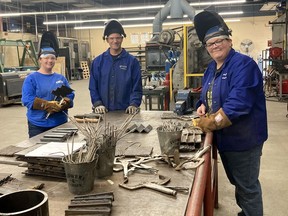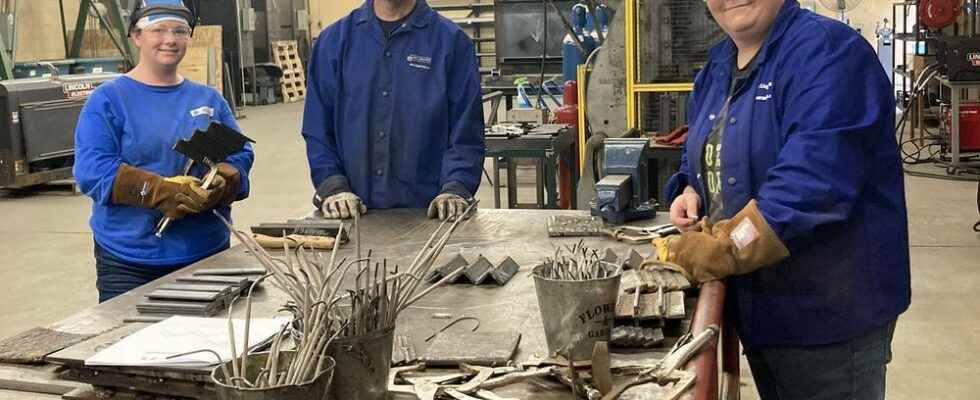
They’re ready to prove their metal mettle.
About 80 people have graduated from a special welding program run by the Workforce Planning Board of Grand Erie to fill local needs and help hold together the area’s economic growth and stability.
“We know from our research that welding is the most in-demand trade in Grand Erie and across the province,” says executive director Danette Dalton. “We also know welding is a stepping stone into the skilled trades, so a lot of people start off welding then find their way into other things like electrical, plumbing, or construction.”
But welding has its own advantages, along with high demand. Local welders make about $45,000 a year, and those with more experience or specialties can earn much more. So the Skills2Advance program aims to introduce 150 women and men to the trade, with funding that includes money from the federal and provincial governments.
“We’re definitely trying to target people who are looking for new opportunities but might not have the means to chase them. A lot of young people and young parents have plenty of responsibilities they’re trying to balance and this program is designed to give them a helping hand,” Dalton says.
The two-week, 60-hour free course includes 30 hours of welding training based on a curriculum from the Canadian Welding Bureau, with another 30 hours of instruction in other areas like first aid, health and safety certification, and forklift operation.
Other topics covered include financial literacy, psychological first aid, and well-being.
“All of these offer certifications,” says Dalton, “and are very practical things people can add to their resumes. They meet the needs of local employers and are very transferable from industry to industry, whether it’s warehousing, manufacturing, or even agriculture.”
There are stream twos, Women of Steel, and an identical co-ed course called Mind Over Metal. The overall gender split is 60 per cent men and 40 per cent women, but the planning board wants to send the message women are welcome.
Dalton says, “We’re alleviating fears that they can get into the industry and actually do the job. A lot of these women have never been in a shop, haven’t grown up with a mentor in the trades, and haven’t been exposed to these kinds of things.
“But in the program, they’re coming together, supporting each other, and going out into the world with much more confidence, not just in the trade but in themselves.”
Participants range from youth to people in their 50s and 60s wanting to upgrade their skills. Education levels vary from less than high school to those with university degrees. In the course, there’s plenty of information to help people complete high school or move on to other post-secondary programs.
The training is provided by four area colleges: Six Nations Polytechnic in Brantford, Fanshawe in Simcoe, Conestoga in Cambridge and Brantford, and Mohawk in Hamilton. It’s open to those new to welding, anyone wanting to change careers, and workers who have jobs with employers who want them to enhance their skills.
“We find that people are getting so excited about what they’re learning that they sign up for other programs at the colleges,” Dalton says. And there’s follow-up for a year after the course, to ensure graduates get the support they need.
Help during and after the training might include safety boots and work clothes, transportation and even groceries for those in need.
Though the planning board is still crunching the numbers, Dalton estimates at least half of the 80 graduates so far have found jobs, returned to their employers, or are well placed to find a position.
“Our whole community thrives when each individual has a living wage and a good quality of life,” Dalton says. “That’s the ultimate goal because the cost of living is extraordinary and programs like this are ideal for supporting industry and workers.
“We can’t draw more investment or even retain it, unless we have a strong workforce. So it only makes sense to provide programming like this, and without our incredibly supportive partners, none of this would happen.”
Current funding is in place to graduate about 150 people and the planning board is hopeful the program will be extended because, when it comes to enhancing the local workforce, welding is just the ticket.
“It’s really amazing to see so many people come away from the program so happy,” Dalton says, “and that just makes my day. That’s all I need, really.”
Note: This article was part of the Focus on Brant special section published in the Brantford Expositor
